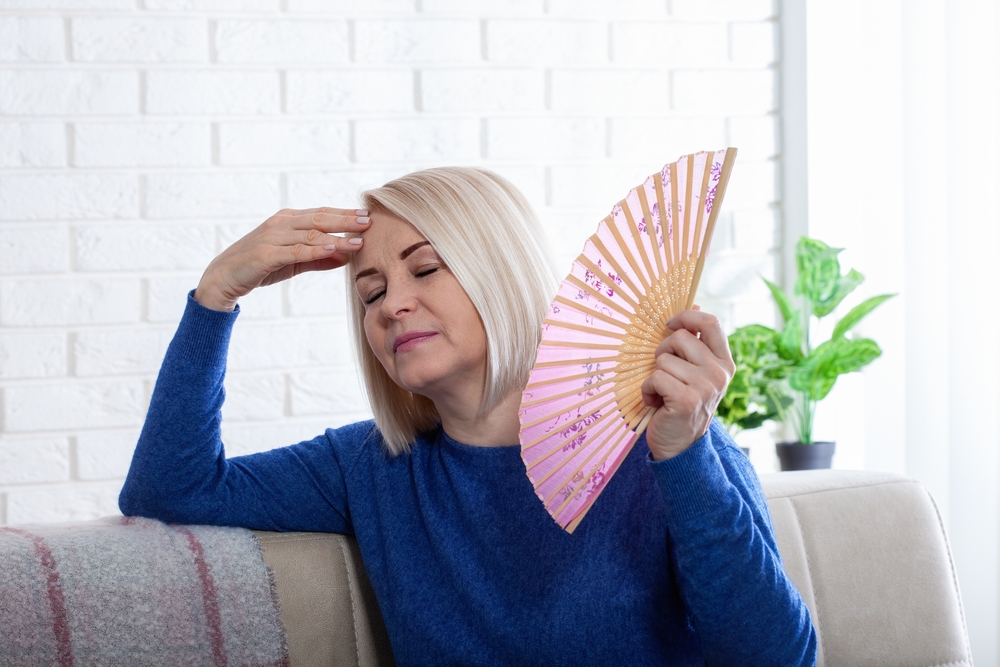As gynecologists, we often witness the physical and emotional changes that women experience throughout different stages of their lives. One particularly challenging phase that many women navigate is perimenopause, a transitional period leading up to menopause. Perimenopause can bring about a myriad of symptoms, and one aspect that deserves special attention is the impact it can have on mental health, specifically the emergence of perimenopause-related anxiety.
That said, in this article, the expert team at Doral Beach Gynecology talks about the connections between anxiety and perimenopause.
Understanding Perimenopause
Before delving into the intricate relationship between perimenopause and anxiety, let’s explore what perimenopause entails. Perimenopause is the transitional phase that precedes menopause, typically starting in a woman’s 40s but sometimes as early as her mid-30s. It is characterized by irregular menstrual cycles, fluctuating hormone levels, and a variety of physical and emotional symptoms.
Perimenopause is a natural progression as the ovaries gradually reduce their production of estrogen and other hormones. While menopause officially begins when a woman has not had a menstrual period for 12 consecutive months, perimenopause marks the period leading up to this milestone.
The Nexus Between Perimenopause and Anxiety
As hormonal fluctuations become more pronounced during perimenopause, they can trigger a cascade of changes that extend beyond the physical realm and influence mental well-being. Anxiety, characterized by feelings of unease, worry, and fear, can become a prominent feature of perimenopause for many women.
The hormonal rollercoaster experienced during perimenopause can affect neurotransmitters in the brain, such as serotonin and gamma-aminobutyric acid (GABA), which play key roles in regulating mood and anxiety. Additionally, the various symptoms of perimenopause, such as hot flashes, sleep disturbances, and changes in libido, can contribute to heightened stress levels.
Recognizing Perimenopause-Related Anxiety Symptoms
It’s crucial to recognize the symptoms of perimenopause-related anxiety to address them effectively. Common manifestations include:
- Increased Worry and Tension: Women may find themselves excessively worrying about various aspects of their lives, even in situations that wouldn’t normally cause significant stress.
- Mood Swings: Fluctuating hormone levels can lead to mood swings, ranging from irritability to tearfulness, making emotional regulation challenging.
- Sleep Disturbances: Insomnia or disrupted sleep patterns are common during perimenopause, exacerbating feelings of anxiety.
- Physical Symptoms: Anxiety during perimenopause can manifest with physical symptoms such as muscle tension, headaches, and gastrointestinal issues.
Can Perimenopause Cause Anxiety?
The intricate interplay of hormonal changes, neurotransmitter fluctuations, and the challenges posed by perimenopausal symptoms can indeed contribute to the development of anxiety. It is important to recognize that perimenopause-related anxiety is a legitimate and common experience affecting many women as they navigate this transitional phase.
Coping Strategies for Perimenopause-Related Anxiety
Thankfully, there are various strategies that women can incorporate into their lives to manage perimenopause-related anxiety effectively. Here are some evidence-based approaches:
Hormone Replacement Therapy (HRT): A Comprehensive Approach
Hormone Replacement Therapy (HRT) stands as a cornerstone in addressing perimenopausal symptoms, including anxiety. For women experiencing severe symptoms, HRT involves supplementing the body with estrogen and, in some cases, progesterone. This helps balance hormonal levels and alleviate the intensity of perimenopausal symptoms, including anxiety. However, it’s crucial to note that HRT may not be suitable for everyone, and individualized discussions with healthcare providers are essential to assess potential risks and benefits.
Mind-Body Techniques: Cultivating Inner Calm
Mind-body techniques provide women with practical tools to navigate the emotional turbulence of perimenopause. Practices such as yoga, meditation, and deep-breathing exercises are not merely relaxation tools; they actively reduce stress hormones, promoting a sense of inner calm. By incorporating these techniques into daily routines, women can enhance mindfulness, enabling them to respond more adaptively to the challenges presented by perimenopause-related anxiety.
Regular Exercise: Boosting Mood and Quality of Life
Physical activity emerges as a powerful ally in managing perimenopause-related anxiety. Engaging in regular exercise stimulates the release of endorphins, the body’s natural mood enhancers. This not only improves mood but also contributes to better sleep quality – a significant factor in alleviating anxiety symptoms. Whether it’s brisk walking, jogging, swimming, or participating in group fitness classes, finding an activity that brings joy and fulfillment can be a crucial component of anxiety management during perimenopause.
Nutrition and Supplements: Nourishing the Body and Mind
Adopting a balanced and nutritious diet is foundational for overall well-being, and it plays a pivotal role in hormonal balance during perimenopause. Foods rich in phytoestrogens, such as soy products and flaxseeds, can be beneficial. Additionally, incorporating omega-3 fatty acids from sources like fatty fish and walnuts, along with vitamin B-rich foods, supports mood stability and may help reduce anxiety. For those with specific dietary restrictions or challenges, supplements can be considered, with consultation from a healthcare provider for personalized recommendations.
Counseling and Support Groups: Embracing Emotional Wellness
The emotional toll of perimenopause-related anxiety can be profound, making the guidance of a mental health professional invaluable. Counseling provides a safe and supportive environment to explore and address the unique challenges that perimenopausal women face. Additionally, participating in support groups offers the opportunity to connect with others going through similar experiences. Sharing stories, insights, and coping strategies within a supportive community can significantly contribute to emotional well-being during this transitional phase.

Empowering Women to Navigate Perimenopause
In the intricate landscape of perimenopause, a holistic approach to managing anxiety is essential. Each woman’s journey is unique, and finding the right combination of coping strategies requires a personalized and collaborative effort between the individual and healthcare professionals.
While hormone replacement therapy, mind-body techniques, regular exercise, nutrition, and counseling form a robust toolkit for managing perimenopause-related anxiety, it’s crucial to recognize the dynamic nature of women’s health. Regular check-ins with healthcare providers, open communication about symptoms, and a proactive approach to overall well-being contribute to a more empowered and confident navigation through perimenopause.
By embracing a comprehensive approach that encompasses both medical and lifestyle interventions, women can not only alleviate perimenopause-related anxiety but also embrace this transformative phase with resilience, self-awareness, and a renewed sense of well-being. As healthcare providers, it is our commitment to support and guide women through this journey, ensuring they emerge from perimenopause with both physical and emotional vitality.
Navigating Perimenopause with Confidence
In conclusion, perimenopause can bring about a complex interplay of physical and emotional changes, including the emergence of anxiety symptoms. Understanding the connection between perimenopause and anxiety is the first step toward effective management. By incorporating a combination of medical interventions, lifestyle adjustments, and emotional support, women can navigate this transitional phase with greater ease and confidence.
Recognizing the legitimacy of perimenopause-related anxiety and adopting proactive strategies can empower women to prioritize their mental health during this transformative period. With the right tools and support, the journey through perimenopause can be not only manageable but also an opportunity for personal growth and resilience.
That said, if you wish to learn more about perimenopause or are looking for gynecological services in Doral, FL, feel free to schedule an appointment with us today.


